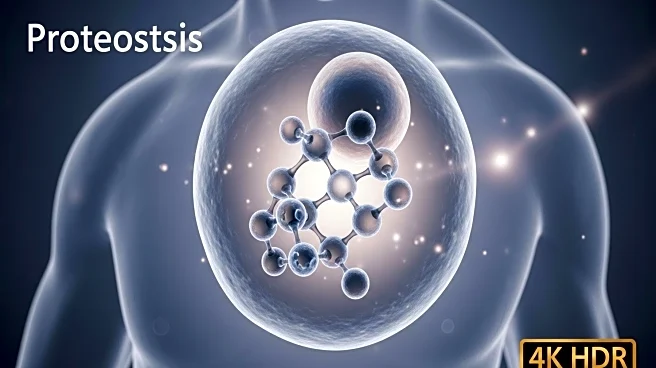What's Happening?
Recent research has delved into the proteostasis mechanisms within human oocytes, focusing on the degradative machineries such as lysosomes and proteasomes, alongside mitochondrial activity. The study, conducted by Zaffagnini et al., examined immature germinal vesicle oocytes and mature metaphase II (MII) eggs from healthy donors. The findings revealed a decrease in degradative capacity as oocytes mature to the MII stage, with reduced proteasomal, lysosomal, and mitochondrial activity compared to surrounding cells. The study noted that while proteasomal components remain unchanged during maturation, lysosome numbers decrease and appear to be exocytosed.
Why It's Important?
Understanding proteostasis in human oocytes is crucial for advancing reproductive biology and fertility treatments. The observed decrease in degradative activity could impact oocyte quality and developmental potential, influencing assisted reproductive technologies. This research provides insights into cellular processes that may affect fertility, offering potential pathways for improving oocyte preservation and maturation techniques. The findings could lead to enhanced protocols in fertility clinics, benefiting individuals seeking reproductive assistance.
What's Next?
Further research is needed to explore the underlying mechanisms of decreased proteolytic activity in oocytes and its implications for fertility. Scientists may investigate potential interventions to enhance oocyte quality and maturation, aiming to improve outcomes in assisted reproductive technologies. Collaboration between reproductive biologists and clinicians could lead to innovative approaches in fertility treatments, addressing challenges faced by individuals with reproductive issues.
Beyond the Headlines
The study highlights the importance of using endogenous oocytes rather than in vitro matured eggs, which may not accurately reflect natural conditions. This approach underscores the need for precision in reproductive research, ensuring findings are applicable to real-world scenarios. The ethical considerations of using human oocytes in research also warrant attention, balancing scientific advancement with respect for donor rights and privacy.











